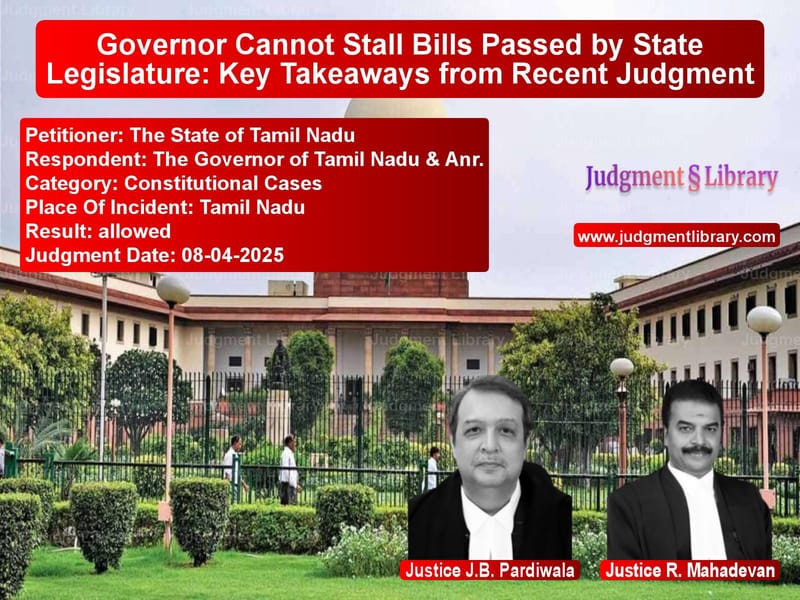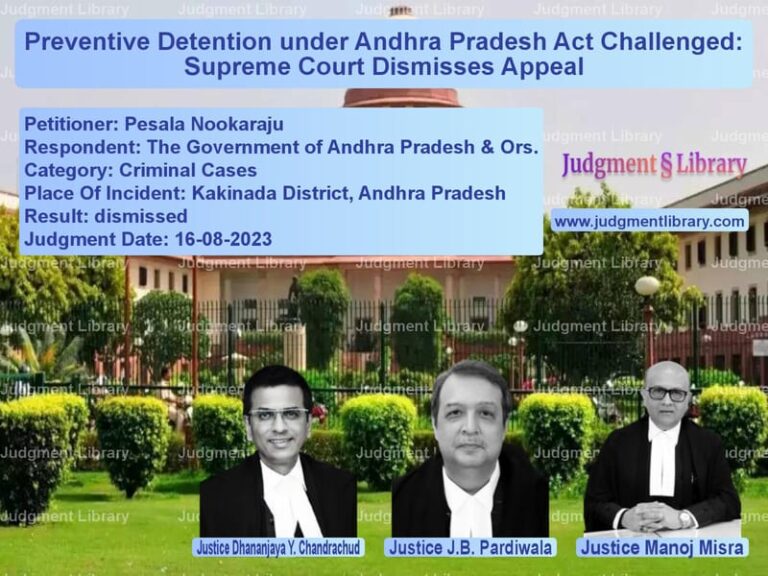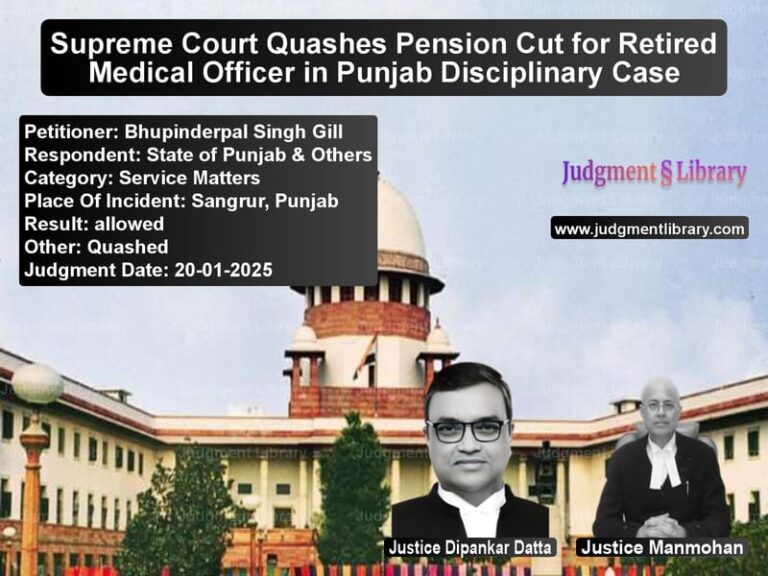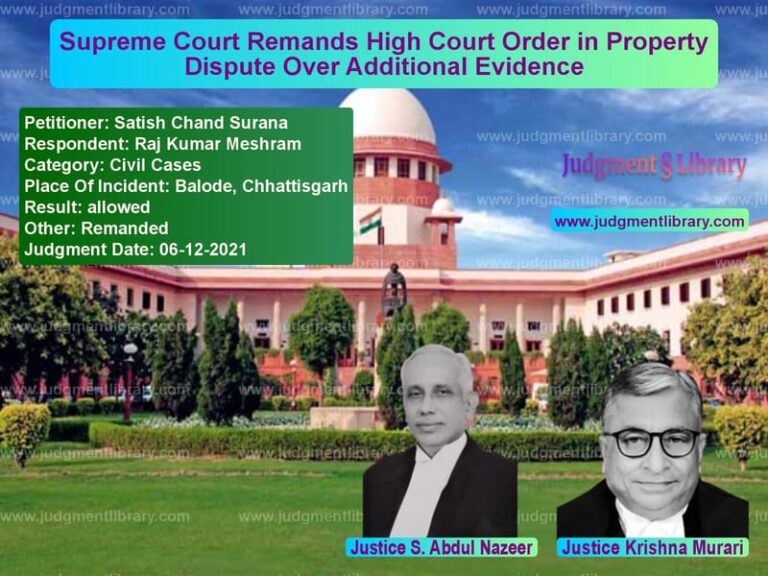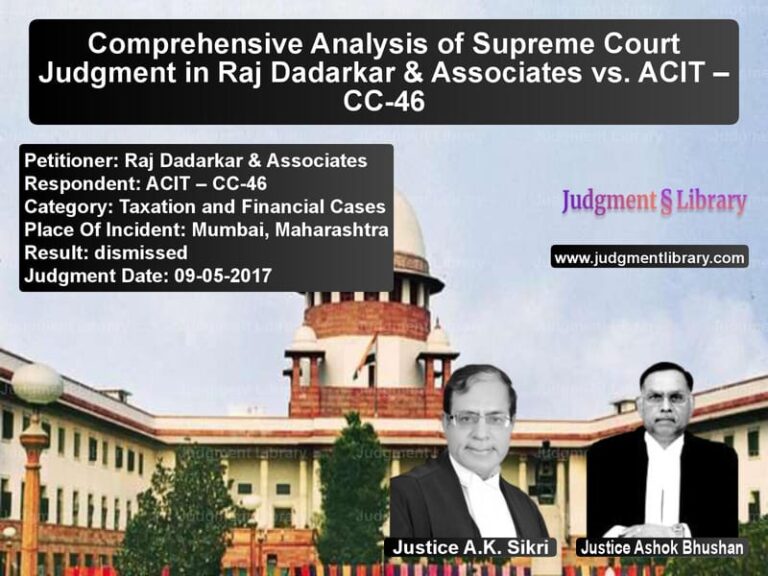Governor Cannot Stall Bills Passed by State Legislature: Key Takeaways from Recent Judgment
In a landmark ruling that reaffirms the delicate balance of power between constitutional functionaries, the Supreme Court has decisively settled the contentious dispute between the State Government of Tamil Nadu and the Governor of Tamil Nadu over a series of legislative and executive matters. This case—The State of Tamil Nadu v. The Governor of Tamil Nadu & Anr.—raised critical constitutional questions surrounding the Governor’s powers under Article 200 of the Constitution, particularly in matters concerning withholding of assent to Bills, delays in giving such assent, and the scope for judicial review over such gubernatorial conduct.
The petitioner, the State of Tamil Nadu, invoked Article 32 of the Constitution seeking judicial intervention against what it described as the ‘inaction’ and ‘unconstitutional overreach’ by the Governor. The inaction pertained to several Bills passed by the State Legislature that were pending assent from the Governor, delays in sanctioning prosecution of public officials for corruption, non-action on proposals regarding premature release of prisoners, delay in appointments to the Tamil Nadu Public Service Commission (TNPSC), and disputes regarding dismissal and reappointment of State Ministers. At the center of this legal and political maelstrom was the Governor’s unprecedented move to withhold assent to ten Bills and subsequently reserve them for consideration of the President even after they were repassed by the State Legislature.
Background of the Dispute
Between January 2020 and April 2023, the Tamil Nadu State Legislature passed 12 Bills and sent them for gubernatorial assent as per Article 200. Despite taking office in November 2021, the Governor did not act on any of the Bills until November 2023, prompting the State to file a writ petition on 31 October 2023. Following the issuance of notice by the Court, the Governor on 13 November 2023 took action—he withheld assent to ten Bills and reserved two for the President’s consideration. In response, the State Legislature reconvened in a special session on 18 November 2023 and re-passed the ten withheld Bills. However, on 28 November 2023, the Governor again reserved these repassed Bills for the President’s consideration, triggering fresh allegations of constitutional impropriety from the State Government.
Arguments by the Petitioner
The State, represented by Senior Advocates Mr. Rakesh Dwivedi and Dr. Abhishek Manu Singhvi, put forth a detailed critique of the Governor’s actions. Mr. Dwivedi argued:
“Pocket veto is not available under the Indian constitutional scheme. The Governor could not have kept the Bills submitted to him between the years 2020 and 2023 in a cold storage without taking any decision on them. The fact that he entered no discussion with the State Government or the Chief Minister in relation to the Bills submitted to him further indicates that the Governor exercised pocket veto, thereby bringing the constitutional machinery to a standstill.”
The petitioner submitted that Article 200 is not a carte blanche for the Governor. The phrase “shall declare” implies that the Governor must act and not defer indefinitely. Withholding assent without stating any reasons or forwarding a message to the State Legislature violates the mandatory procedure under the first proviso to Article 200.
“The State Legislature must be told why the assent has been withheld so as to enable it to reconsider the Bill. In the absence of any message, it would be open to the State Legislature to understand that the Governor wishes the entire Bill to be reconsidered.”
Mr. Singhvi elaborated on the limits of discretion under Article 200, submitting that:
“The Governor is merely a titular or de jure head of the State and the task of governing the State is entrusted to the Chief Minister and his Council of Ministers… Gubernatorial procrastination is a new phenomenon and requires judicial intervention for finding a new solution within the Constitutional framework.”
The petitioners relied heavily on precedents such as State of Punjab v. Principal Secretary to Governor and S.R. Bommai v. Union of India to argue that judicial review applies even to the highest constitutional authorities where unconstitutional action is suspected.
Respondent’s Submissions and Justification
The Governor’s office submitted that the Bills were withheld or reserved due to their alleged repugnancy with Central laws, particularly Entry 66 of List I, which relates to coordination and determination of standards in higher education. The Governor cited the Supreme Court judgment in Union of India vs. Valluri Basavaiah Chowdhary, where the Court acknowledged the Governor’s discretion under Article 200 to reserve a Bill for Presidential consideration.
The Governor also claimed that the repassed Bills suffered from the same legal infirmities and therefore were again reserved under Article 200. However, the petitioners countered this by pointing out that once a Bill is reconsidered and passed again by the State Legislature, the Governor is constitutionally mandated to grant assent and cannot reserve it again.
“The Governor had not returned the Bills under the proviso to Article 200 for re-consideration, however, the State Government has sent them back. Since the Bills suffer from repugnancy, the Hon’ble Governor has reserved the same for the consideration of the Hon’ble President.”
The Supreme Court’s Verdict
The Supreme Court, in a scathing indictment of the Governor’s conduct, ruled in favor of the State of Tamil Nadu. The Court held that once the Governor withholds assent and the Legislature repasses the Bills, the Governor is obligated to act according to the first proviso to Article 200.
“The expression ‘shall not withhold assent therefrom’ is a clear indicator that the exercise of the power under the first proviso is relatable to the withholding of the assent by the Governor to the bill in the first instance… It does not bind the State Legislature.”
The Court emphasized that constitutional functionaries must act within the constraints of the constitutional scheme, and arbitrary or mala fide inaction is subject to judicial review.
“The Governor cannot sit over the Bills enacted by the Legislature indefinitely as that would be against the interest of the people who elect the Government… Gubernatorial procrastination cannot derail democratic will.”
Regarding the repugnancy argument, the Court found that the Governor failed to specify which Central laws the State Bills were repugnant to, thereby demonstrating non-application of mind. The reservation of the Bills was deemed unconstitutional, and the Court directed the Governor to grant assent forthwith.
Broader Constitutional Implications
This verdict clarifies and reaffirms several key principles:
– The Governor’s powers under Article 200 are not absolute and must be exercised in a time-bound manner.
– Pocket veto or indefinite delay is unconstitutional and against the spirit of federalism.
– Withholding of assent must be accompanied by a message under the first proviso to Article 200.
– Once a Bill is re-passed, the Governor must grant assent; reserving it again is not an available option.
– Judicial review is available against the conduct of Governors and Presidents if their actions violate the Constitution.
Conclusion
The Supreme Court’s judgment in this case stands as a crucial reaffirmation of the democratic ethos and the rule of law. It protects legislative sanctity and ensures that the will of the people, as expressed through their elected representatives, is not undermined by unelected constitutional figures. By emphasizing mandatory time frames, limits of discretion, and the supremacy of the Constitution, the Court has strengthened Indian federalism and restored the balance of power between the Legislature and the constitutional head of the State.
This ruling sends a clear signal to all constitutional authorities: they are not above the Constitution, and any deviation from its mandates—especially those that threaten the functioning of a democratically elected government—will not be tolerated.
Petitioner Name: The State of Tamil Nadu.Respondent Name: The Governor of Tamil Nadu & Anr..Judgment By: Justice J.B. Pardiwala, Justice R. Mahadevan.Place Of Incident: Tamil Nadu.Judgment Date: 08-04-2025.Result: allowed.
Don’t miss out on the full details! Download the complete judgment in PDF format below and gain valuable insights instantly!
Download Judgment: the-state-of-tamil-n-vs-the-governor-of-tami-supreme-court-of-india-judgment-dated-08-04-2025.pdf
Directly Download Judgment: Directly download this Judgment
See all petitions in Fundamental Rights
See all petitions in Constitution Interpretation
See all petitions in Legislative Powers
See all petitions in Public Interest Litigation
See all petitions in Separation of Powers
See all petitions in Judgment by J.B. Pardiwala
See all petitions in Judgment by R. Mahadevan
See all petitions in allowed
See all petitions in supreme court of India judgments April 2025
See all petitions in 2025 judgments
See all posts in Constitutional Cases Category
See all allowed petitions in Constitutional Cases Category
See all Dismissed petitions in Constitutional Cases Category
See all partially allowed petitions in Constitutional Cases Category

